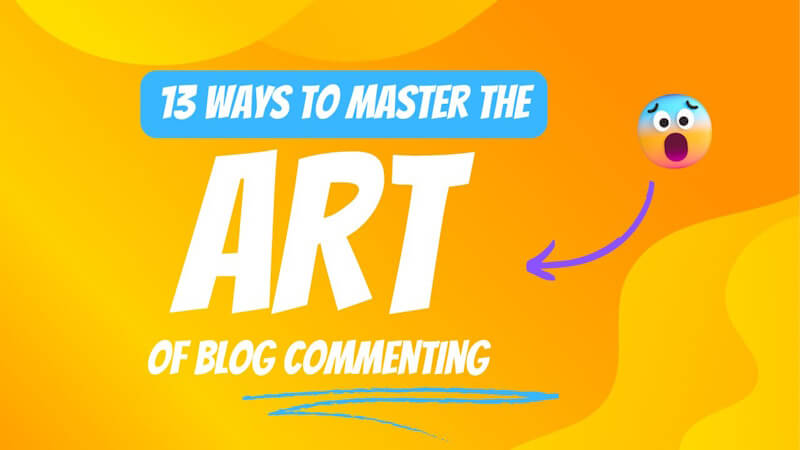13 Ways to Master the Art of Blog Commenting

Every content marketing strategy should involve a plan for blog commenting. It’s entirely too easy to get stuck in a comfort zone of creating content, while keeping up on other blogs in your niche via RSS feeds or email subscription. However, taking the time to leave comments really matters, and it’s an integral part of your content promotion strategy whether you realize it or not. Content marketing expert Ken Mueller cites his regular commitment to leaving comments as a critical success measure, stating “[i]t has been incredibly important to my growth as a blogger, and to the growth of my business.”
Over 2 million blog posts are published every 24 hours. Individuals with digital influence can be your best bet to get noticed amidst an abundance of content. If you’re struggling to build key relationships in your industry to publish guest posts, or your content promotion efforts to date have fallen flat, blog commenting could be the missing ingredient. Consider the following benefits of consistently leaving thoughts on other blogs:
Build Relationships
Every connection with another blogger matters, whether they’ve amassed a significant online following or they’re just starting to create content. Blog commenting can leave a bigger impression on another writer than just sharing their article on X (formerly Twitter) or Facebook.
Establish Community
The best comments help you build a community within your industry, which can include powerful relationships that lead to mutual content sharing, guest post opportunities, peer relationships and mentoring opportunities.
Earn Referral Traffic
Blog commenting used to be an effective SEO tactic. While the Google search algorithm has changed and no-follow links earned from blog comments result in minimal SEO benefit, sharing valuable information can incentivize other readers to click through to your blog.
Increase Engagement
What’s the best way to increase the volume of comments on your own blog? Leaving comments on other websites, of course. Not only will your traffic soar, you’ll establish a relationship as someone who is actively willing to engage.
Setting Reasonable Expectations
Remember, blog commenting is no longer a silver bullet for your website’s SEO. You’ll likely be pretty disappointed if you think engaging in dialogue on other websites can replace your guest posting strategy for generating website backlinks. In order to receive the maximum benefit from a blog commenting strategy, it’s critical to approach the process as a way to slowly build relationships and community.
SEO expert Dana Tan is a firm believer in the power of blog comments, citing an experience where she spurred a blog post by leaving a well thought-out comment. Tan recommends against worrying about a website’s page rank when determining which blogs to communicate with on a regular basis. Instead, create a list of target blogs based on the value you can receive by being a community member, potential benefits of developing a relationship with a blogger, and your interest in the subject matter. You’ll be able to leave far more insightful and engaging thoughts if you’re able to speak intelligently about the topic, and have sufficient curiosity to ask the right questions.
How to Win at Blog Commenting
There’s a definitive art to leaving outstanding blog comments, and as content marketer Angela Suico points out, stating “Thanks for the insight! Great post!” generates little value. Use the following tactics to overcome your fear of blog commenting and reap all the benefits of participating in others’ communities:
1. Realize it’s Not as Scary as You Think
As Suico points out, many content marketers have an irrational fear of blog commenting. Why? Well, like any new experience, it takes some getting used to. Popular, heavily-trafficked blogs can be particularly overwhelming, especially since established content communities can have a distinct culture and even unique language and abbreviations.
Take a deep breath, and realize that every existing member of the community had to join at one point or another. As long as your mission is to provide value and engage in positive dialogue, there’s almost a surefire chance your blog commenting efforts will be welcomed warmly by the author.
2. Use a Human Name
While blog commenting policies can vary widely between websites, it’s critical to approach the process of leaving feedback as an individual, not a company. Link to your website, but attach your thoughts to your real name or blogging pseudonym. As Search Logistics points out, many bloggers will delete comments attached to a company, regardless of content, in order to maintain a totally spam-free space.
3. Check Blog Comment Policies
Not all bloggers have a policy in place for comments, but it’s always prudent to double-check before you begin typing. While most blog comment policies specifically address the website’s policy on offensive comments, spam, and their right to delete messages at-will, learning the rules can ensure your first experience with the website is a positive one.
4. Read and Re-Read
No one wants to look foolish during their first foray into the world of blog commenting, which is why preparation is key. Read the post thoroughly, and read it twice if you’re going to disagree with the author or question the credibility of any of their resources. Read other comments to determine whether you should leave a new message, or engage with existing dialogue. Be totally certain you can add unique value, and reflect well on your company, before you start typing.
5. Use the Three-Sentence Rule
SEO Strategist Neil Patel advises bloggers to use a three-sentence rule when creating blog comments. While it’s not a hard-and-fast law, it’s hard to add value to a community with one or two sentences. Writing at least a short paragraph will help you relay the fact you’ve actually read the post and have something to share to the author.
6. Share Your Experience
Totally stumped about what to say? If the author didn’t end their post with an engaging question, draw from your experience as a professional or individual to add weight to your point. Do you agree? Do you think the post was off the mark? Sharing an anecdote can instantly add value to your comment.
7. Ask a Question
The best way to turn blog commenting into an ongoing dialogue with another content marketing is to ask an engaging, open-ended question. Be respectful, but don’t be afraid to clarifying something that didn’t quite make sense. As Suico points out, there’s a good chance another reader is wondering the exact same thing.
8. Don’t Be Afraid to Disagree
Did something in the post seem inaccurate, or inconsistent with your own professional experiences or stance? Say so, but say it nicely. Polite and well-phrased disagreement can be a powerful place to start real dialogue about topics that matter in your industry. Remember, every blogger has been targeted by trolls, so use principles of effective rhetoric to get your point across in a way that will ultimately leave a positive impression:
- Provide Reasoning: Do you disagree because you recently read a study that contradicts the author’s position? Say so, and share the resource. Give clear rationale for your position, to avoid coming across as offensive.
- Follow-Up: If you aren’t automatically subscribed to follow-up comments on the blog post, check back often to see whether the author or other commenters have issued a response. If all goes well, your comment will turn into a full-blown conversation.
Never comment anonymously:
If you don’t feel comfortable leaving the comment under your real name, with your website link attached, there’s a pretty good chance you’re about to say something rude or unhelpful.
9. Make It an Ongoing Experience
Does a single attempt at blog commenting mean you’ve established an instant best friendship with the author of the post? Not so much. You’d never expect to be best friends after meeting someone once at a dinner party, so treat engaging with blogs just like any other budding friendship. You don’t need to comment on every post, but maintain a consistent presence and continue to add value to each target blog’s community. Link Assistant recommends keeping track of the bloggers you want to build relationships with in a spreadsheet.
10. Share Resources Sparingly
There are times when you’ll find a blog article which aligns perfectly with something you’ve written. Perhaps you’ve covered a similar topic in-depth. Be cautious about leaving links to specific pages on your website, because the tactic could be perceived as overly aggressive content promotion. Link only when you’ve established rapport, and you’re confident your content will benefit the other community members. However, keep in mind the practice of linking to your own content in comments is controversial in the first place. Stamoulis is in favor of a no-links in comments policy, unless you’re crediting an outside resource for the purpose of supporting your position.
11. Don’t Just Link to Your Homepage
If the website you’re blog commenting on offers free text entry fields for your contact information, you shouldn’t feel the need to simply link to your website homepage or blog. In fact, there’s absolutely nothing aggressive about using the link field to provide a direct path to your social media profiles, or specific pages on your website.
12. Communicate with Colleagues
If your colleagues are also going to aid your content marketing efforts through blog commenting, establish clear lines of communication about who will be engaging where. While there’s probably not going to be any issues with more than one employee of your company engaging with the same blog post, leaving overly similar comments can be perceived as spam-like by authors, and leave a bad taste in their mouth. Alternatively, inadvertently taking a different position from a colleague on the same issue while blog commenting can come across as inconsistent brand messaging.
13. Don’t Take It Personally
Did your thoughtful and valuable comment get ignored by the author? Shrug it off, and don’t let it deter you from your new commitment to blog commenting on a regular basis. Remember, content marketers are super busy, and there’s a good chance the lack of response has nothing to do with the quality of your contribution.
Do you utilize blog commenting as part of your community-building and content promotion strategy? What benefits have you noticed from being an active part of other blog communities?
Comments (10)
Thanks for the list, this list is really helpful. Hope you will share something more nice like this in future as well. Regards
I’m definitely going to start incorporating this into my content promotion strategy. Thanks for breaking it down so clearly!
Great tips. Search engine optimization is a great thing to consider no matter you are having a big or small business. Thanks for sharing these tips here. Keep posting.
Thanks again for the amazing tips! I’ll be putting them into action today.
Such a helpful guide to mastering blog commenting! Loved the practical tips and engaging approach.
It’s really good to read the complete information guide.
Mastering the art of blog commenting can be a powerful tool for networking and building meaningful connections online. This post does a great job of breaking down strategies into approachable steps, making it less intimidating for beginners. I particularly liked the emphasis on adding value to conversations and maintaining authenticity, which are key to standing out. What has been your most effective tip for making your comments more impactful and engaging? Let’s share insights!
This is a fantastic post! Looking forward to reading more of your content in the future!
Great tips on mastering blog commenting! Engaging effectively can really boost visibility and build meaningful connections. Thanks for sharing these insights!
This article breaks down blog commenting in such a practical way! Great tips for engaging meaningfully and building connections. Thanks for sharing!